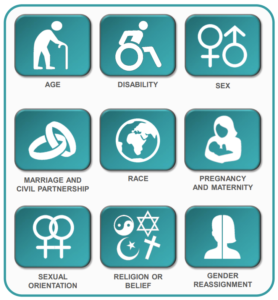What are the nine protected characteristics?
Carolyne Wahlen from Golf HR (in the UK) asks: Are your employees protected from instant dismissal? Read on to find out…
When our clients ask us to advise them on how to part company with an employee, there’s always one question we ask right at the very top:
“Do they have any protected characteristics?”
And there’s a reason why: if you dismiss someone with a protected characteristic in a hurry, and without making sure you’ve done it by the book, you’re leaving yourself wide open at tribunal.
Whenever we ask this question, the most common answer we get is a hurried “No”.
And in most cases? They’re wrong.
You see, almost everyone can claim at least one protected characteristic, even if the claim is rather weak, and often it turns out that lots of people have two or three.
And if that IS the case, they definitely should not be given their marching orders without due care and attention.
Just to be crystal clear, you can still dismiss staff members with one or more protected characteristics, but you’ll need to ensure that performance issues are clearly and regularly documented, with training and supervision included – that way any dismissal can be attributed to performance or attitude, rather than their protected aspect.
With all that said, the critical thing is to understand whether they have got protected characteristics, and the good news is that they’re all defined in the Equality Act 2010.
Having a protected characteristic means you have a right not to be treated less favourably, or subjected to an unfair disadvantage, by reason of that characteristic.
So without further ado, here are the characteristics:
Age
Both ends of the spectrum can claim age discrimination: young people and old people. The reality is that the only age that would not be able to claim age discrimination is 30 to 40 year olds.
Everyone else can claim it, and the older or younger they are, the stronger their claim that they have been dismissed for that reason. It is difficult to dismiss the only 69-year-old on the greenkeeping team and expect to NOT get an age discrimination claim.
Sex
In the huge majority of cases this would be anyone other than a male who is protected. So if you are dismissing the only female on the greens team, or if you give the female bar staff fewer benefits than the male greens team, expect a gender discrimination claim.
Sexual harassment also falls under this protected characteristic and is ‘any unwanted conduct of a sexual nature or other conduct based on sex’. There are two distinct elements to this. The first is ‘conduct of a sexual nature’. This is the conduct that can be described as having a sexual motive or perceived as having a sexual motive. Comments about sexual behaviour or unwanted touching that can appear minor in nature to extreme behaviours that amount to sexual assault or rape could all be categorised as ‘conduct of a sexual nature’.
However the other distinct element of ‘conduct based on sex’ is also a form of sexual harassment. It is about the abuse of power in a way that demeans the value of one sex or another in the day-to-day environment. Demeaning comments about women or about men that are intended to ‘put them in their place’ fall into this. Although that behaviour may be targeted at an individual, it need not be. In those circumstances the behaviour creates a culture that permits it to be acceptable and creates the power balance in terms of who is valued and who is not.
Sexual orientation
In the huge majority of cases this is going to be anyone other than heterosexuals. Even if the employee is not anything other than heterosexual, if they are teased or ribbed for being ‘gay’, they can sue you for discrimination by perception. Other staff, witnessing the teasing, can sue you as well. In most of these cases we deal with, it’s fellow staff members being the problem rather than members of the golf club. And the club is liable for the behaviour of all staff members. It might just seem like a bit of harmless banter, but a claim can be brought at any point, no matter how long they previously thought it was fun.
Marriage and civil partnership
Are you only hiring single people, so that they will go out for a drink after work? Or just married people because they are ‘more reliable’? Either way, a person’s relationship status should not be used as reason to dismiss or not hire them.
Pregnancy and maternity
You can’t dismiss a woman for being pregnant. Or single her out for dismissal when she is on maternity leave. If she cannot do the job because of her pregnancy, that is not a justification to dismiss her. That doesn’t mean she’s immune from dismissal – if she punched a customer in the face, yes you would be able to dismiss, but you’d need to go through a full disciplinary process to demonstrate that her behaviour, not the pregnancy, is the reason for the dismissal.
Disability discrimination
This covers all physical and mental health conditions that affect health for longer than 12 months. This would include, for example, diabetes, depression, cancer. Staff with long term health conditions need to have ‘reasonable adjustments’ made to their tasks to help them be able to carry them out. Reasonable adjustments are not clearly defined in law. Letting a cleaner use an already installed lift to go upstairs would be considered reasonable, installing a lift for them would not.
There are conditions which are ring fenced as a ‘disability’ from the point of diagnosis and these include cancer, HIV and Aids and multiple sclerosis, while under the law, addictions (for example, alcoholism) are not counted as a disability.
Race
If the member of staff has a different nationality or even comes from a different part of the country (for example, the only Scottish person on your staff), then they can claim race discrimination.
Belief
This covers religious belief but also political and environmental belief. This can be picking on staff for being a different religion (Muslim), but it will also include picking on staff for being a sub-division of Christianity, such as Catholic, Protestant, Lutheran and so on, or for supporting a football team that is associated with a different sub-division such as Celtic versus Rangers.
Gender reassignment
You cannot discriminate against a person who chooses to identify with the opposite gender to their birth gender.
There is no requirement to have had an operation or to be under medical supervision for them to be protected.
So there you have it – the protected characteristics. Don’t do anything without consulting the list, and if there’s ANY hint that they’ve got one and it could be used in their favour, hold your horses, give us a call and we’ll help.
For advice or any other staff or member issue affecting your golf club, please contact Carolyne Wahlen, Golf HR, on cw@golfhr.co.uk or 01491 598 700


















Let me tell You a sad story ! There are no comments yet, but You can be first one to comment this article.
Write a comment